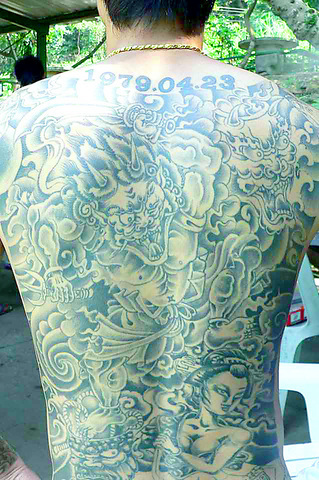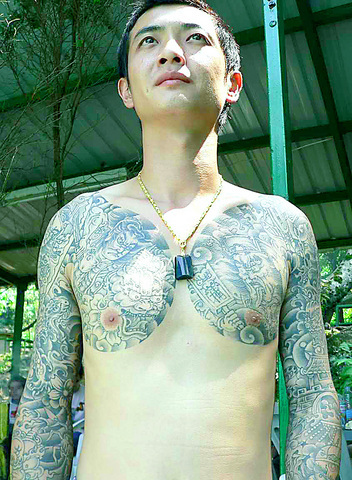Interactive art takes on a whole new meaning this weekend, as Taipei hosts only its second ever Taiwanese Tattoo Convention, in the Xinyi district near the Warner Village complex, outside New York New York department store.
Activities start tomorrow around 10am with a break-dancing competition. During regular intervals in the competition, the crowd will be treated to a cat-walk show of tattooed models. Expect to see quality work by local artists and, in particular, full-body tattoos of Daoist mythological gods and demons perfectly sculpted around muscles that in their movements make legendary battles seem vividly alive. "Life is art," the adage goes and there can be no better way to express such an ideal and to celebrate the human form.
For the rest of the day, until 8pm, the buzz of the tattoo gun will fill the air as a team of a dozen tattoo masters will be offering their services to anyone who decides to get inked. The convention will undoubtedly draw a larger crowd on Sunday and proceedings are set to start at 10am again with a similar line up to the day before.

PHOTO NICK WHEELER, TAIPEI TIMES
Since dynastic China, tattoos have been seen as the badge of criminal fraternities, so there is no surprise that in modern Taiwan, as in Japan, people with tattoos are still viewed in a negative light by a large segment of society. One of the principle organizers of the event Tsai Jong-da (
Two weeks ago in his studio, Tsai explained the importance of the quality of the inks used by tattooists. He uses either British or US products and, in the unlikely event that the colors should fade after only a few years, free touch-ups are provided. He then continued by saying a full back piece would cost a few hundred thousand NT$, as heavily shaded work demands a greater degree of attention and is extremely time consuming, not to mention energy draining for both customer and artist.
Books full of various images will be available at the convention for those unable to come up with an original design, but most people that choose to be tattooed spend time tailor-making something that is meaningful to them. All tattoo artists present will be more than happy to discuss ideas with the initiated and first-timer alike.

Foreign tattoo enthusiast Andrew Braddock says, "If you are going to be marked forever, you have to think very seriously about something that represents you in a timeless sense." He also said that art should be as alive as possible and should always be fluid, ever-changing and never stagnant, just like the human body; hence he thought of tattooing as one of the highest forms of art. He concluded his interesting theory by drawing a comparison between tattooed people and martial artists: "Martial artists have overcome their emotions and their actions are solely based upon a philosophy. In much the same way, someone who wants to get tattooed has to overcome his emotions and, presuming he has chosen a design that reflects his own beliefs, must then live up to it."
There won't be another chance, at least not for another year, to see the transformation of the normal into the colorful and extraordinary with tattoo art.

June 2 to June 8 Taiwan’s woodcutters believe that if they see even one speck of red in their cooked rice, no matter how small, an accident is going to happen. Peng Chin-tian (彭錦田) swears that this has proven to be true at every stop during his decades-long career in the logging industry. Along with mining, timber harvesting was once considered the most dangerous profession in Taiwan. Not only were mishaps common during all stages of processing, it was difficult to transport the injured to get medical treatment. Many died during the arduous journey. Peng recounts some of his accidents in

“Why does Taiwan identity decline?”a group of researchers lead by University of Nevada political scientist Austin Wang (王宏恩) asked in a recent paper. After all, it is not difficult to explain the rise in Taiwanese identity after the early 1990s. But no model predicted its decline during the 2016-2018 period, they say. After testing various alternative explanations, Wang et al argue that the fall-off in Taiwanese identity during that period is related to voter hedging based on the performance of the Democratic Progressive Party (DPP). Since the DPP is perceived as the guardian of Taiwan identity, when it performs well,

A short walk beneath the dense Amazon canopy, the forest abruptly opens up. Fallen logs are rotting, the trees grow sparser and the temperature rises in places sunlight hits the ground. This is what 24 years of severe drought looks like in the world’s largest rainforest. But this patch of degraded forest, about the size of a soccer field, is a scientific experiment. Launched in 2000 by Brazilian and British scientists, Esecaflor — short for “Forest Drought Study Project” in Portuguese — set out to simulate a future in which the changing climate could deplete the Amazon of rainfall. It is

What does the Taiwan People’s Party (TPP) in the Huang Kuo-chang (黃國昌) era stand for? What sets it apart from their allies, the Chinese Nationalist Party (KMT)? With some shifts in tone and emphasis, the KMT’s stances have not changed significantly since the late 2000s and the era of former president Ma Ying-jeou (馬英九). The Democratic Progressive Party’s (DPP) current platform formed in the mid-2010s under the guidance of Tsai Ing-wen (蔡英文), and current President William Lai (賴清德) campaigned on continuity. Though their ideological stances may be a bit stale, they have the advantage of being broadly understood by the voters.